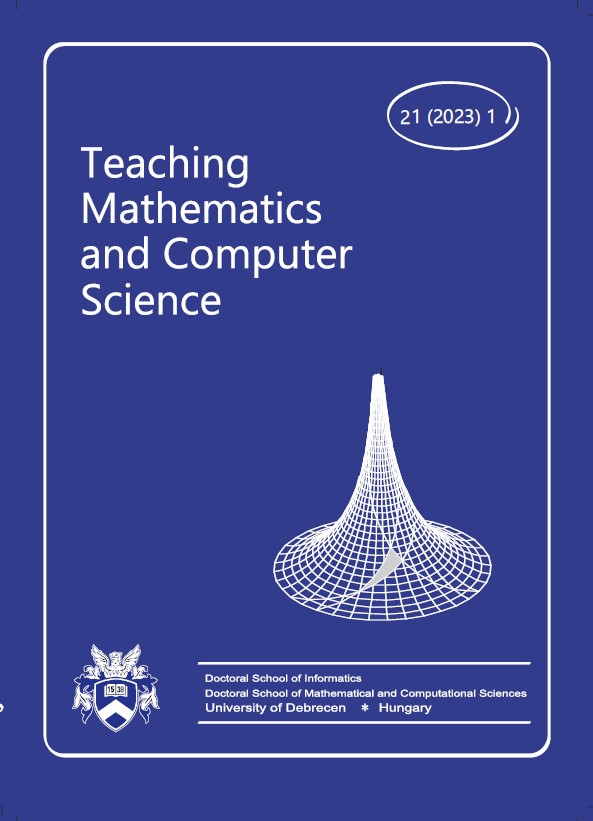Vol. 21 No. 1 (2023)
##issue.tableOfContents##
Articles
-
Psychology - an inherent part of mathematics education
1-18Views:264On the chronology of individual stations of psychology and their effect on mathematics education designed as working document for use in teacher training.
The article is structured as a literature survey which covers the numerous movements of psychology towards mathematics education. The current role of psychology in mathematics education documented by different statements and models of mathematics education should provide a basis for the subsequent investigations. A longitudinal analysis pausing at essential marks takes centre of the continuative considerations. The observed space of time in the chapter covers a wide range. It starts with the separation of psychology from philosophy as a self-contained discipline in the middle of the 19th and ends with the beginning of the 21st century. Each stop states the names of the originators and the branches of psychology they founded. These stops are accompanied by short descriptions of each single research objective on the one hand, and their contributions to mathematics education on the other hand. For this purpose, context-relevant publications in mathematics education are integrated and analysed. The evaluation of the influence of concepts of psychology on teaching technology in mathematics is addressed repeatedly and of great importance. The layout of this paper is designed for the use as a template for a unit in teacher-training courses. The conclusion of the article where the author refers to experiences when teaching elements of psychology in mathematics education courses at several universities in Austria is intended for a proof on behalf of the requested use.Subject Classification: 01A70, 01-XX, 97-03, 97D80
PDF260 -
Mobile devices in Hungarian university statistical education
19-48Views:186The methodological renewal of university statistics education has been continuous for the last 30 years. During this time, the involvement of technology tools in learning statistics played an important role. In the Introduction, we emphasize the importance of using technological tools in learning statistics, also referring to international research. After that, we firstly examine the methodological development of university statistical education over the past three decades. To do this, we analyze the writings of statistics teachers teaching at various universities in the country. To assess the use of innovative tools, in the second half of the study, we briefly present an online questionnaire survey of students in tertiary economics and an interview survey conducted with statistics teachers.
Subject Classification: 97-01, 97U70, 87K80
PDF256 -
Supporting the education of engineering mathematics using the immediate feedback method
49-61Views:197In the literature, several methods are suggested to deal with problems regarding the efficiency of mathematics education including techniques that help integrate new knowledge into long-term memory. We examined how effective the application of the immediate feedback method is in teaching engineering mathematics. The article presents the method used and the results obtained during the study.
Subject Classification: 97D40, 97D60
PDF215 -
An examination of descriptive statistical knowledge of 12th-grade secondary school students - comparing and analysing their answers to closed and open questions
63-81Views:204In this article, we examine the conceptual knowledge of 12th-grade students in the field of descriptive statistics (hereafter statistics), how their knowledge is aligned with the output requirements, and how they can apply their conceptual knowledge in terms of means, graphs, and dispersion indicators. What is the proportion and the result of their answers to (semi-)open questions for which they have the necessary conceptual knowledge, but which they encounter less frequently (or not at all) in the classroom and during questioning? In spring 2020, before the outbreak of the pandemic in Hungary, a traditional-classroom, “paper-based” survey was conducted with 159 graduating students and their teachers from 3 secondary schools. According to the results of the survey, the majority of students have no difficulties in solving the type of tasks included in the final exam. Solving more complex, open-ended tasks with longer texts is more challenging, despite having all the tools to solve them, based on their conceptual knowledge and comprehension skills. A valuable supplement to the analysis and interpretation of the results is the student attitudes test, also included in the questionnaire.
Subject Classification: 97K40, 97-11, 97D60
PDF188 -
Report of Meeting Researches in Didactics of Mathematics and Computer Sciences: 31 March – 2 April, 2023 Oradea, Romania
83-107Views:356The meeting Researches in Didactics of Mathematics and Computer Sciences was held in Oradea, Romania, at Partium Christian University, from 31 March to 2 April, 2023. It was organized by the Doctoral School of Mathematical and Computational Sciences of the University of Debrecen and Partium Christian University. The 85 participants – including 18 PhD students – came from 9 countries and represented 30 institutions of higher and secondary education. There were 4 plenary and 53 session talks in the program.
PDF350 -
Correction to Mneimneh (2019): "Simple variations on the Tower of Hanoi: A study of recurrences and proofs by induction” Teaching Mathematics and Computer Science 17 (2019), 131-158.
109Views:140In the article “Simple variations on the Tower of Hanoi: A study of recurrences and proofs by induction” by Saad Mneimneh (Teaching Mathematics and Computer Science, 2019, 17(2), 131–158. https://doi.org/10.5485/TMCS.2019.0459), there was an error in Table 1 (p. 155), and consequently, the first paragraph of Section 8 (p. 154) also needed correction.
PDF140







